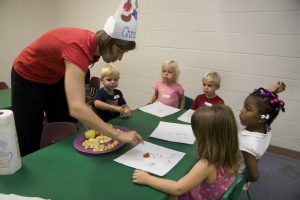 Chapel Hill, NC – New resources for child care programs from the nationally recognized Go NAPSACC platform will incorporate the elements of farm-to-table eating starting in March 2018. Researchers with UNC Chapel Hill’s Children’s Healthy Weight Research Group will be expanding resources in their interactive web-based platform known as Go NAPSACC. Since its inception, Go NAPSACC has been used to address breastfeeding and infant feeding, child nutrition, physical activity, outdoor play and learning, screen time, and oral health. Farm-to-ECE (Early Care and Education) is a natural extension of the existing resources. Go NAPSACC is already being used in six states, including Iowa, Louisiana, Maine, North Carolina, Oklahoma, and Virginia.
Chapel Hill, NC – New resources for child care programs from the nationally recognized Go NAPSACC platform will incorporate the elements of farm-to-table eating starting in March 2018. Researchers with UNC Chapel Hill’s Children’s Healthy Weight Research Group will be expanding resources in their interactive web-based platform known as Go NAPSACC. Since its inception, Go NAPSACC has been used to address breastfeeding and infant feeding, child nutrition, physical activity, outdoor play and learning, screen time, and oral health. Farm-to-ECE (Early Care and Education) is a natural extension of the existing resources. Go NAPSACC is already being used in six states, including Iowa, Louisiana, Maine, North Carolina, Oklahoma, and Virginia.
Eating fresh local foods helps young children develop an appreciation for healthy eating that can last a lifetime. Early care and education programs are ideal places to introduce young children to fresh local foods. To support such efforts, researchers at the University of North Carolina at Chapel Hill (UNC-CH) received a two-year grant from the W.K. Kellogg Foundation (WKKF) to create Farm-to-ECE resources. The grant will also expand availability of Go NAPSACC to ECE providers in six additional states, including Georgia, Michigan, Mississippi, New Mexico, Pennsylvania, and Wisconsin.
The idea builds off the growing farm-to-table movement, in which restaurants focus on ingredients sourced from local farms to create their menus. Goals of this movement are to increase the use of fresh, high-quality, and nutritious foods, and support small and local farmers. Go NAPSACC’s Farm-to-ECE resources bring this healthy local practice to child care programs. These resources offer child care programs ways to use more local, healthy foods in children’s meals and snacks, teach children about gardening and where foods come from, and talk with families about where to find local foods.
Development of the new Farm-to-ECE resources were guided by national leaders in Farm-to-ECE. “We want to identify the best ideas from this Farm-to-ECE movement and help make them achievable for any child care program” said Dr. Dianne Ward, lead researcher from the UNC-CH team. As with other Go NAPSACC resources, Farm-to-ECE includes a self-assessment for child care programs, action planning tools, and a library of tips and materials to help achieve the recommended best practices. The Farm-to-ECE resources will be available through the existing web-based platform for child care programs at https://gonapsacc.org.
“The ability to leverage the Go NAPSACC platform to further expand the Farm-to-ECE movement to additional ECE programs is a tremendous opportunity,” observed Linda Jo Doctor, Program Officer at WKKF. “Access to healthy food is critical to the development of children and their success in school and life. We are excited to fund this initiative that will get good food into ECE facilities and support local farmers and businesses.”
# # #
About Go NAPSACC: gonapsacc.org is an easy-to-use web-based toolkit for early care and education programs interested in building healthy eating and physical activity habits in children. Go NAPSACC is based on a set of best practices that stem from the latest research and guidelines in the field. Programs use Go NAPSACC to improve their practices, policies, and environments and meet these best practices.
# # #
The W.K. Kellogg Foundation (WKKF), founded in 1930 as an independent, private foundation by breakfast cereal pioneer, Will Keith Kellogg, is among the largest philanthropic foundations in the United States. Guided by the belief that all children should have an equal opportunity to thrive, WKKF works with communities to create conditions for vulnerable children so they can realize their full potential in school, work and life.
The Kellogg Foundation is based in Battle Creek, Michigan, and works throughout the United States and internationally, as well as with sovereign tribes. Special emphasis is paid to priority places where there are high concentrations of poverty and where children face significant barriers to success. WKKF priority places in the U.S. are in Michigan, Mississippi, New Mexico and New Orleans; and internationally, are in Mexico and Haiti. For more information, visit www.wkkf.org.
For inquiries:
Rachel M. Bartlett, MS RD
(919) 962-4733
bartrm@email.unc.edu
